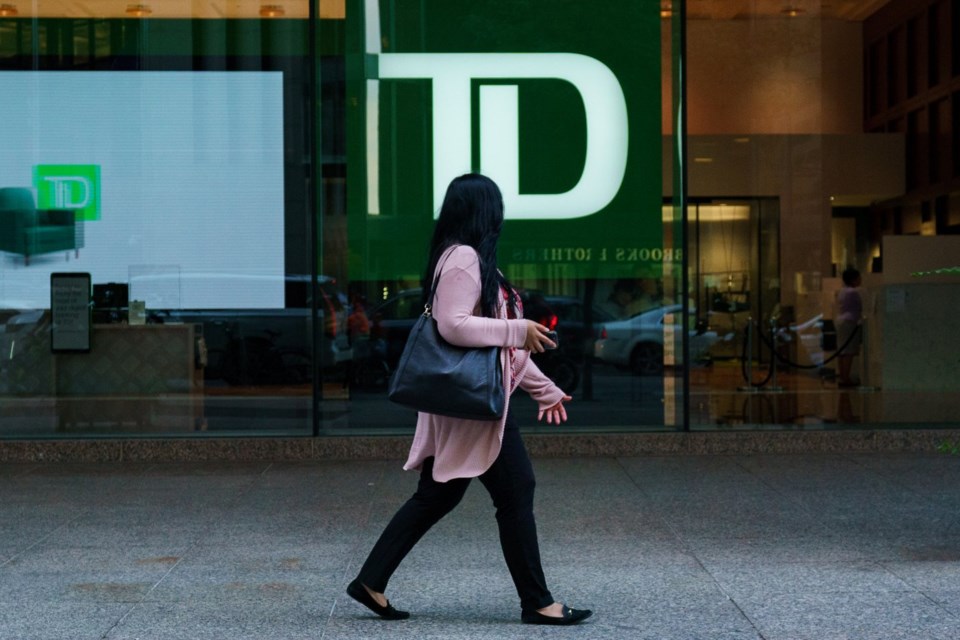TORONTO — Toronto-Dominion Bank has agreed to pay fines totalling about US$3.09 billion from U.S. regulators after pleading guilty to multiple charges related to failures in its anti-money laundering program.
U.S. Attorney General Merrick Garland said in a Thursday afternoon press conference that TD has become the largest bank in U.S. history to plead guilty to Bank Secrecy Act program failures and the first to admit to conspiracy to commit money laundering.
The total fine includes a US$1.8 billion settlement with the U.S. Department of Justice and U.S. Attorney’s Office for the District of New Jersey related to their investigation. The U.S. Financial Crimes Enforcement Network handed TD a US$1.3 billion penalty.
The bank also received a cease-and-desist order, a US$450 million penalty and non-financial sanctions from the Office of the Comptroller of the Currency that put limits on its growth in the U.S. after it found TD's transaction monitoring program had "significant, systemic breakdowns."
Garland said TD created an environment "that allowed financial crime to flourish."
"There is nothing wrong with a bank that tries to make its services convenient for its honest customers, but there is something terribly wrong with a bank that knowingly makes its services convenient for criminals," he told reporters at the news conference.
"TD Bank chose profits over compliance in order to keep its costs down. That decision is now costing the bank billions of dollars in criminal and civil penalties."
TD said the fines will be mostly covered by previous provisions it set aside totalling US$3.05 billion. It has also agreed to remediate its anti-money laundering program and be subject to formal oversight of that process.
The total assets of TD's two U.S. banking subsidiaries cannot exceed US$434 billion as part of the sanctions. That restriction does not apply to TD Securities or any of the bank's Canadian or other global businesses.
TD will be subject to more stringent approval processes in the U.S. for new bank products, services, markets and stores.
TD chief executive Bharat Masrani called it a "difficult chapter in our bank's history."
"This is on us. We own it. We should have done better," Masrani told analysts on a conference call on Thursday.
"We know what the issues are. We are fixing them as we move forward. We're ensuring that this never happens again. This is a sad day in our history, but we know what we have to do to go forward."
Last month, Masrani said the shortcomings were his to bear as the bank announced Raymond Chun will replace him upon his retirement next year.
The probes have been a major overhang for the bank and helped scuttle its proposed US$13.4-billion acquisition of U.S. bank First Horizon Corp. last year.
Garland said the bank admitted in its plea agreement it allowed three money laundering networks to transfer more than US$670 million through TD Bank accounts over a six-year period.
At least one of those schemes involved five TD Bank employees who conspired with criminal organizations to open and maintain accounts at the bank which were used to launder US$39 million to Colombia, including money from drug proceeds, said Garland.
"At various times, high-level executives, including the person who became the bank's chief anti-money laundering officer, knew there were serious problems with the bank's anti-money laundering program, but the bank failed to correct them," he said.
In total, the U.S. Department of Justice has prosecuted two dozen people for their involvement in those money laundering schemes, said Garland. He said the justice department has charged two TD employees for their involvement in one of those schemes.
Due to the settlement, TD said 2025 would be a "transition year" with short-term costs that will necessitate a balance sheet restructuring by the bank. It said it will reduce U.S. assets by around 10 per cent in 2025 and maintain elevated levels of liquidity as part of that plan.
In a statement, Canada's banking regulator thanked U.S. authorities for their "sustained and continuing engagement in this matter."
"Deficiencies in any institution's anti-money laundering regime are a prudential risk," said Peter Routledge, superintendent of financial institutions.
"In cases where such deficiencies arise, OSFI expects and can require the board and management of an institution to take the necessary corrective measures without delay and with particular emphasis on corporate governance, compliance, and financial and operational resilience."
This report by The Canadian Press was first published Oct. 10, 2024.
Companies in this story: (TSX:TD)
Sammy Hudes, The Canadian Press




